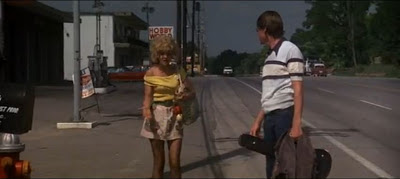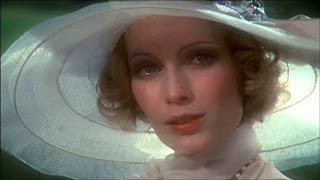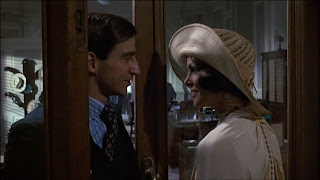Karen Black's passing this week of cancer at the age of 74 has brought back a flood of memories of how following her career, and watching her movies, greatly expanded my knowledge of cinema and television. I first discovered her while watching "Airport 1975" (1974) on the CBS Late Movie around 1986. I was in junior high school at the time and I always loved movies and television since I was little, but I never had a true understanding of the medium up to that time. While watching Karen Black in "Airport 1975," I became fascinated by her performance (I'll never forget the heartbreakingly sincere way she delivered the line "There's no one left to fly the plane!") and, as a result, began watching as many of her films as I could get my hands on. Over the next few years, I discovered all of her 1970s classics like "Five Easy Pieces" (1970), "The Day of the Locust" (1975), and "Nashville" (1975) and she easily became one of my favorite actresses. In so doing, I became familiar with the "New Hollywood" group of directors who rose to prominence in the 1970s as the traditional studio system was in decline. If it weren't for Karen Black, it might have taken me awhile to get around to exploring that era of filmmaking. By this point, however, Karen Black's career in the 1980s had degenerated into appearing in direct-to-video "B" movies. Nevertheless, I marveled at how her name continued popping up in the "Variety" production listings of films currently, or about to start, filming. It appeared as if she never stopped working, which turned out to be both a curse and a blessing for her career, depending on how you look at it.
As a big fan of her work, what makes her passing particularly poignant and bittersweet is reading all of the tributes being written about her in mainstream publications and websites, as well as seeing all of the fond and affectionate comments left by many of her fans at the end of these obituaries. I kept thinking "Where was all of this acclaim and affection for her while she was still alive? Why didn't this translate into continued employment in major-studio films and major awards and nominations?" Even though many of her obituaries mentioned that she had made over 150 films, it should be made clear that many of those films were obscure, little-seen productions that usually played at film festivals or went straight to video or DVD. The last time she made a film that could be considered a major studio release was Rob Zombie's horror movie "House of 1,000 Corpses" (2000), which was produced by Universal, and filmed on their backlot, but released by Lion's Gate when Universal chickened out of releasing it. I happened to have seen many of her obscure movies because I consciously sought them out, but people who were more casual movie-goers were under the false--but understandable--impression that she had stopped working circa 1979.
Even though I was very complimentary of her career longevity in my previous post about her, unfortunately, Karen Black must ultimately take some responsibility for diminishing her own cache as an A-list actress by continuing to accept roles in one B-movie after another, especially during the 1980s and 1990s. Similar to Stella Stevens, I believe that Black would have had a better career had she not spread herself thin with the sheer multitude of second-rate movies she appeared in. (In her defense, Black acknowledges some of the bad career choices she made during a particularly candid moment in the 2000 documentary, "Karen Black Actress at Work.") It's a shame that it took her death to make it apparent that Karen Black still had a significant following--a fervently loyal audience--who would have welcomed seeing her appear in higher-profile productions. She deserved to be as revered on a wide-spread basis as her 1970s counterparts Ellen Burstyn or Diane Keaton.
Even though one would have liked to have seen her retain her A-list status, it's possible that Karen Black made herself too obscure for people to easily appreciate at times. As much as I respected and enjoyed her work, the lady herself had a tendency to present herself in a rambling, oblique, roundabout manner that some people may have found off-putting. In a very illuminating interview on YouTube from 1986, where she is interviewed by Charlie Rose in order to promote her new movie "Invaders from Mars" (1986), Black comes across as prickly, incoherent, self-aggrandizing and self-involved--although charmingly so. At one point, she's caught on camera distractedly fiddling with her fingernails. Despite her idiosyncracies, Karen Black ultimately proved to be as unique and engaging an individual off-screen as she was an actress on-screen. She didn't have a flat personality off-screen the way the aforementioned Ellen Burstyn often comes across in interviews, and she didn't come across as whiny as Diane Keaton could in her interviews. At one point, she brashly tells Charlie Rose "I'm terribly good with the English language...my verbal I.Q. is genius and when I went to college I didn't have to take English at all. Anyway, so I've been writing. And it's probably very silly that I hadn't been writing for so many years given that kind of potential--my mother's a writer--but anyhow I have a friend, Paul Williams, who's a Harvard summa person...summa, did I say that right? Thank you. And he noticed that I was very literate and he said 'Well you've got to write, you've got to write, you've got to write.' And thanks to him I wrote a screenplay, finally, called 'Deep Purple' when I was terr--...it's very interesting when you have a good sense of the language and you know and all that. Plus you're an actor and you get SO involved in writing that when something goes wrong with these characters you, I mean the secretary came in, thought someone in the family had died. It's just consuming."
While watching the interview, you sense that, within minutes, Charlie Rose has gone from being a respectful fan to someone who is impatiently trying to take control of the discussion again. When Rose announces that he has to go to a commercial break--in the middle of Black's anecdote that the screenplay she wrote was accepted at Sundance--she attempts to save face by defensively responding "Oops, you're going now? What a time to leave me." She pouts, sits back in her chair, leaning her head against her upraised hand and petulantly says "Bye." In so doing, Karen Black makes it quite clear that she was an individual who always operated on her own unique wavelength. Which, of course, added to our fascination of her as a person as well as an actress.
My current opinion about Karen Black is shaped by an anecdote that an actress friend of mine recently shared with me about being at a dinner party with her 10 years ago that was filled with other actors and industry people. This actress friend has enjoyed a long and prolific career for the last 35 years in films, television and theater. She had a hit TV series for several years in the 1980s and continues to work in independent movies. My friend recalled how Karen Black looked across the table and said to her "You're very pretty. What do you do for a living?" My friend responded by saying "Well, I'm an actress," to which Black said, "Oh, it must be so difficult for new people like you to get started in the business" and then proceeded to lecture her on the importance of getting proper training as an actress in order to develop her craft and tried to "mentor" her throughout the dinner. My friend, her husband, and many of the others at the table were surprised that Karen Black automatically presumed she was a neophyte--instead of regarding her as a peer even if she wasn't immediately familiar with her career--and no one at the table had the heart to correct her. Ultimately, my friend said that Karen Black was very kind and well-meaning and she took it as a compliment that Black thought she was in her 20s or 30s when she was actually in her late 40s when this incident took place.
Nevertheless, this anecdote helped solidify my impression of Karen Black as someone who saw herself as the foremost expert on filmmaking and acting, as opposed to simply viewing herself as just one out of many accomplished and experienced actresses with a knowledgeable perspective about her craft. In her defense, however, Karen Black would not be the first actor or actress who saw themselves as some sort of acting and filmmaking guru. The industry is filled with admittedly accomplished individuals who have a subjective view of their stature. However, in her defense, I believe that some of the latter-day attention she received at film tributes held at places like the Castro Theater, or other venues where she was exalted by adoring fans as a larger-than-life icon, may have gone to her head and contributed to her less-than-humble belief in her own importance, and may also explain why she was rarely held accountable to give coherent interviews when discussing her craft. It stands to reason that, if an individual is told all of the time how wonderful they are, they are eventually going to believe it about themselves.
As eccentric as Karen Black may have appeared to be at times, she still did not deserve to be ridiculed by the president of a marketing and communications firm in a presentation he made at a marketing convention held in Washington, DC on June 5th, 2013. By this time, news of her battle with cancer had already been in the media since March after Black and her husband asked the public for help in funding experimental cancer treatments in Europe. In this marketing presentation, which used to be available on YouTube but has since been taken down as of Friday morning after news of Karen Black's death was announced in the media, the president of the marketing firm compared the career accomplishments of Karen Black and Betty White in order to demonstrate how he felt organizations should learn how to "brand" themselves. The title of this presentation was called "Association Branding--Are you Karen Black or Betty White? (Exactly, who's Karen Black?)," and attempted to make the case that Betty White had created a stronger "brand" name for herself, compared to Karen Black, and that this was supposed to explain the differences in the levels of success between both actresses. In the presentation, White was depicted respectfully, while Black was portrayed in a derisive manner by the president of the marketing firm (who seemed to be trying to emulate the smug, snarky, and self-satisfied tone of David Letterman in his comedy skits).
While I acknowledge that Karen Black made some mistakes that caused her to slip from being in the A-list, she still had a long and prolific career that most actresses would envy. The subtitle of the presentation, "(Exactly, who's Karen Black?)" further underscored its mean-spirited and myopic nature. The sheer number of fans from all across the world who left comments on all of her obituaries regarding how much they cared about her--not to mention the fans who helped her raise over $60,000 on the internet for her cancer treatment--demonstrates the fallacy of the logic behind the subtitle. It was just bizarre to see Betty White and Karen Black--two actresses who have little, if anything, in common--being compared with one another so extensively. Now that we know that Karen Black had only two months left to live at the time this presentation was made, it was thoughtless and cruel to be casting aspersions on her career accomplishments. When this presentation was still on YouTube, it was distasteful to see these people making a mockery of Karen Black while she was sick in the hospital battling a cancer that, according to her husband, had "eaten away part of a vertebra and nerves in her lower back...Her left leg stopped functioning." It was particularly careless for the president of this marketing firm--and for the marketing and communications organization hosting this convention--to allow this presentation to be made when simply Googling her name would have allowed them to realize that Karen Black was in the midst of battling cancer. If they are reading this, I sincerely hope that all of the people involved with making this shameful presentation--the president of the marketing company, the personnel who helped prepare it, the marketing organization who permitted it, and the audience who snickered derisively at Karen Black's expense--are all deeply ashamed of themselves, but that's probably expecting too much of them.
One continuing theme throughout Karen Black's career was her perseverance and determination despite all of the challenges and hardships that came her way. She never seemed to let the occasional direction her career was headed affect her view of herself--which may explain her headstrong belief in her own stature and importance--and this self-confidence is what makes the prolificacy of her career ultimately an impressive and inspiring achievement. Like Bette Davis--another idiosyncratic actress who defied all the odds in Hollywood--Karen Black continued giving A-list performances even in less than impressive circumstances, which is why her iconic performance as flight attendant Nancy Pryor in "Airport 1975" is such a perfect metaphor for Black's career. Even under treacherous circumstances, Black always managed to take control of a damaged career and find the strength and resolve to fly it to safety and ensure long-term survival. In an industry that values image and frivolity over genuine accomplishment, Black is a classic example of an old-fashioned professional with a solid work ethic. With fewer and fewer of her type left, we are eventually getting to the point where there truly is "no one left to fly the plane" in show business.

































